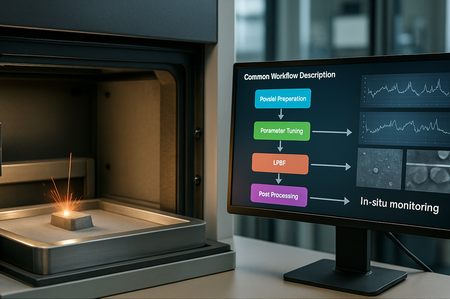
In the pursuit of accelerating materials discovery, experimental methods within Materials Acceleration Platforms (MAPs) are being revolutionized by integrating different materials classes and fabrication methods, such as glass production, additive manufacturing of metals, and 3D printing of polymers. This use case focuses on the rapid prototyping of glassy composites and novel metal alloys using advanced additive manufacturing (AM) techniques combined with automated characterization and machine learning (ML) guided iterative workflows. The objective is to significantly evaluate and implement workflows and methods to shorten the materials development loop, enabling fast innovation in high-impact fields like aerospace, energy storage, and biomedical engineering.
| Main requirements: - Capture detailed process metadata, e.g., print parameters, thermal profiles, post-processing steps - Standardized ontologies, formalized workflows and persistent IDs for materials, experiments, and data provenance (for instance through ELN) - Advanced 3D printing platforms (e.g., laser powder bed fusion for metals and automated glass synthesis rigs |
| Main Task Area: TA-WLE Other related Task Areas: TA-SAI |
| Possible connections within NFDI: - |
| Material/Data: Metals, glasses, polymers / process parameters and experimental results |
| Main Success Scenario: Collection of successful implementations of materials acceleration platforms |
| Added value for the MatWerk community: Accelerate the optimization of new materials by building a FAIR, automated, and scalable research data infrastructure that tightly integrates fabrication, characterization, and feedback-driven workflows. |
One compelling example is the 3D printing of metal alloys, such as titanium and iron, using laser powder bed fusion (LPBF). This complex and data-rich process involves multiple interdependent steps, including powder preparation, parameter tuning, in-situ monitoring, post-processing, and multi-scale characterization. Capturing and standardizing these steps into a machine-readable format, such as Common Workflow Descriptions (CWDs), enables reproducibility, transparency, and interoperability across different research facilities. This formalized workflow ensures that experimental procedures, metadata, and decision logic are clearly documented, which is especially critical in collaborative environments like Materials Acceleration Platforms (MAPs). By adopting this structured approach, researchers can reduce setup time, minimize human error, and seamlessly integrate the workflows with machine learning pipelines for accelerated discovery.
In parallel, rapid prototyping of glassy composites demonstrates how optimizing glass formulations can tailor optical and mechanical properties. Automated high-throughput characterization tools are tightly coupled with ML algorithms that guide the iterative design cycles, optimizing print parameters and predicting material performance. Together, these examples illustrate how advanced additive manufacturing techniques combined with automated workflows and data-driven optimization can significantly shorten the materials development loop, enabling faster innovation for aerospace, energy storage, and biomedical applications.
NFDI-MatWerk
Funded by the Deutsche Forschungsgemeinschaft (DFG, German Research Foundation) under the National Research Data Infrastructure – NFDI 38/1 – project number 460247524.
NFDI-MatWerk
Funded by the Deutsche Forschungsgemeinschaft (DFG, German Research Foundation) under the National Research Data Infrastructure – NFDI 38/1 – project number 460247524.
Subscribe to our newsletter for regular updates about materials science topics!
After subscribing, you will receive an email from us with a confirmation
link.
Only after clicking this link your registration is completed.